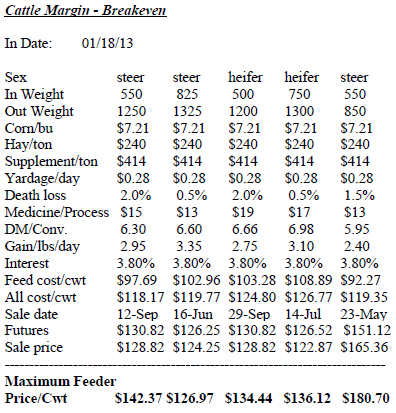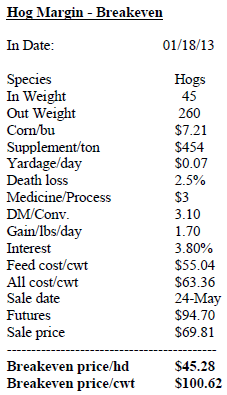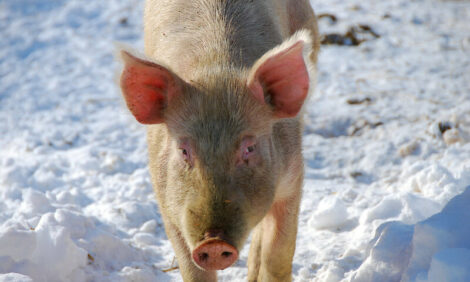



Weekly Roberts Market Report
US - Corn closed higher on support from fundamentals that show US ending stocks extremely tight, writes Michael T. Roberts.Upcoming Meetings:
- 8 February - Grain outlook - New Bern. Call (252) 633-1477 for details.
- 13-14 February - NC Dairy / Beef Conference – Hickory Convention Center. Contact Steve Washburn at ((919) 515-7726
- 26 February - Dairy Risk Management meeting - Iredell County Extension Center.
- Time - 10:00 am – 2:30 pm.
- $5.00 pre-registration or $10.00 at the door (for lunch planning).
- Topics include:
- A) Explaining in laymen’s terms Dairy Livestock Gross Margin Insurance by Dr David Anderson from Texas A&M University
- B) the Latest look at the farm bill re: dairy by Dr Scott Brown from the University of Missouri
- C) Grain and Dairy Outlook by … well me.
- Call 704-873-0507 to register or email me for brochure. You must register for lunch.
- 27 April – 2013 High Country Cattle Conference - Upper Mountain Research Station, Cattle and grain outlook. Contact Micah Orfield at (336) 846-5850
Note: If you would like a meeting in your area please contact me to see how we can work that out. As always I am available for risk management consultation as needed. See contact information below.
Risk Management Term of the Week: --- Relative Strength Index – RSI – One of many measures of market momentum designed to help determine when a market is overbought or oversold. The index is based on moving averages of closing futures prices.
Risk Management Principle of the week: The “RSI“ can be calculated of reach of the contracts for which a commodity is traded. Most commercial chart services calculate the RSI for the nearby month and move to the next month when the delivery period for the nearby futures contract commences. Most RSI’s are calculated on either a base 14 or base 9 day price change. To calculate a 14-day RSI – record the last 14 day-to-day price changes based on closing prices. Sum the negative and positive changes and divide each sum by 14 to create a “down average“ and “up average,“ respectively. Define relative strength index as Up/(Up + Down) then multiply by 100 to convert to percentages versus decimals. An RSI 30 or below is said to be oversold. An RSI of 70 or above is said to be overbought. When a contract is oversold there is pressure to move prices upward. When a contract is overbought, there is pressure to move prices down.
CORN futures on the Chicago Board of Trade (CBOT) closed up on Monday. MAR’13 corn futures closed at $7.274/bu; up 3.0¢/bu and 3.5¢/bu over last report. The DEC’13 contract closed at $5.904/bu; up 4.0¢/bu and 6.5¢/bu higher than this time last week. Corn closed higher on support from fundamentals that show US ending stocks extremely tight. Crude oil and heating oil were up and corn futures follow are tied to those commodities somewhat now that ethanol is generated from corn. Commercial and fund buying were noted. Corn exports were note reported today due to the Martin Luther King holiday. Late last week exports were running steady-to-firm. The national average basis strengthened to -3.0¢/bu under CBOT March futures. For now producers should consider holding off pricing anymore of the 2013 crop.
SOYBEAN futures on the Chicago Board of Trade (CBOT) closed up on Monday with the exception of the nearby contract. The MAR’13 contract closed at $14.292/bu; down 1.0¢/bu but 11.0¢/bu higher than last week at this time. NOV’13 futures closed at $12.862 … 922/bu; up 7.0¢/bu and 6.0¢/bu over last report. Soybeans were supported late last week by brisk exports while crude oil and heating oil were higher resulting in spillover strength. Prices were pressured late in the session by a sell-off from non-commercials. Soybean basis was steady with the river terminals showing weakness on Friday as barge freight was flat to end the week. Cash soybean basis weakened with the latest national average soybean basis placed at -14.0¢/bu under the Chicago March 2013 futures contract; lower than this time last week. Producers should consider holding off pricing more of the 2013 crop at this time.
WHEAT futures in Chicago (CBOT) closed up on Monday. MAR’13 wheat futures finished at $7.912/bu; up 10.0¢/bu and 24.0¢/bu over last report. The JULY’13 contract closed at $8.044/bu; up 9.25¢/bu and 27.0¢/bu higher than this time last Monday. CBOT wheat futures posted double digit gains late in the day, before light selling timed the rally. Forecasts for dry weather and solid buying from commercials and non-commercials were supportive. Basis levels for wheat were steady. The Soft Red Winter wheat basis index was placed at -24.0¢/bu under CBOT March futures; even with last report. Hard Red Winter Wheat basis index was placed at -42.0¢/bu under Kansas City March futures; 2.0¢/bu cents over last report. Hard Red Spring Wheat average basis index was placed at -48.0¢/bu under the Minneapolis March futures contract; 1.0¢/bu better than last week at this time. It might be a good idea to consider pricing a small portion of the 2013 crop.
DAIRY CLASS III futures on the Chicago Mercantile Exchange (CME) finished near even on Monday. The JAN’13DA futures closed at $17.50/cwt, even with Friday but $0.62/cwt lower than last report. The MAR’13DA contract closed at $17.90/cwt; even with last Friday but $0.24/cwt higher than a week ago. MAY’13DA futures closed at $18.30/cwt; up $0.20/cwt but $0.02/cwt lower than this time last Monday. Steady-to-higher milk production continued across the country with heavy manufactured milk supply. November milk sales declined -.5% from a year ago. Flavored milk and organic milk sales have increased. Cheese prices were not supported in the absence of aggressive bidding. Cheese plants increased production to take advantage of declining milk prices. Churning activity increased last week with production heavier than demand. Inventory was seen as building. Class III futures were: 3 months out = $17.50/cwt ($0.29/cwt lower than a week ago); 6 months out = $17.79/cwt ($0.25/cwt lower than this time last week); 9 months out = $18.07/cwt ($0.18/cwt under last report); and 12 months out = $18.12/cwt ($0.15 lower than last Monday). This week the variable cost of production for the average North Carolina conventional 200 cow dairy with a 23,000 lb average is $22.32/cwt with a slight increase in milk price. The price sensitivity table below shows better milk prices are aiding dairy farm profitability and illustrates different returns/cow relative to varying increases and decreases to both milk prices and inputs costs over total Variable Costs for the same NC farm.

LIVE CATTLE futures on the Chicago Mercantile Exchange (CME) closed mixed on Monday. FEB’13LC futures closed at $124.950/cwt; down $1.650/cwt and $5.400/cwt lower than a week ago. APR’13LC futures closed at $129.825/cwt; off $1.050/cwt and $4.930/cwt lower than last report. The AUG’13LC contract closed at $126.525/cwt; down $0.150/cwt and $3.380/cwt lower than last Monday. Idling of a major beef plant pressured prices. Cargill Inc. announced Thursday it was closing its Plainview, TX plant on Feb. 1 on tight supplies that has forced the packer to reduce its daily processing loads and hours of operation. Thin-to-negative packer margins have not helped. The latest HedgersEdge packer margin was placed at a negative $44.30/head based on $125.57/cwt buy vs. the breakeven of $121.97/cwt. Users of grain should buying feed needs for the next 3 – 5 weeks.
FEEDER CATTLE at the CME finished up on Monday with the exception of the nearby contract. JAN’13FC futures closed at $143.900/cwt; down $0.500 and $5.55/cwt lower and last report. APR’13FC futures closed at $148.850/cwt; up $0.625/cwt but $4.450/cwt lower than a week ago. The AUG’13FC contract closed at $157.050/cwt; up $0.725/cwt but $3.530/cwt lower than last week at this time. Feeders were supported by short-covering but still lost ground on late profit taking. Demand slowed last week with the shuttering of a large slaughter house in Texas. For Monday 01/21/13 estimated receipts at the closely watched Oklahoma City market were put at 9,000 head vs. 8,648 last week and 9,265500 head this time last year. Compared to last week feeder steers and heifers were $2-$5/cwt lower. Steer and heifer calves were steady. Demand was considered moderate-to-good. Quality was average-to-attractive.

This table shows the maximum price a producer could pay for feeder cattle and still break even, assuming the costs and conversion/performance factors listed above. Producers should remain aware that calculations are based on averages. Courtesy DTN.
LEAN HOGS on the CME finished up on Monday with the exception of the nearby contract. The FEB’13LH contract closed at $85.350/cwt; down $0.600/cwt but $0.130/cwt higher than a week ago. APR’13LH futures closed at $88.075/cwt; even with Friday’s close but $0.230/cwt lower than last report. The JUN’13LH contract closed at $96.850/cwt; up $0.200/cwt but even with last Monday. Pit sources said they are waiting to see where tight cattle supplies take hog prices. Hogs have benefited from solid pork export demand. Deferred contracts were supported by the annual drop-off in supplies of slaughter-ready hogs, due to lighter hog weights attributed to cold weather. Cash hogs were steady-to-higher.

This table shows the maximum price a producer could pay for feeder pigs and still break even, assuming the costs and conversion/performance factors listed above. Producers should remain aware that calculations are based on averages. Courtesy DTN.








